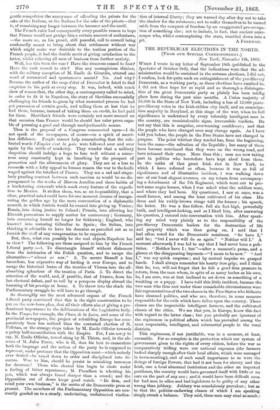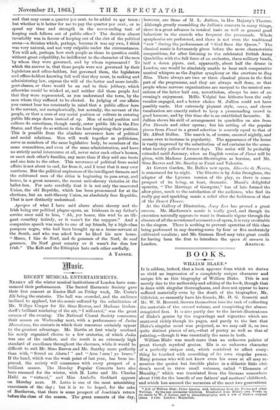THE REPUBLICAN ELECTIONS IN . THE NORTH.
[FROM OCR SPECIAL CORRESPONDENT.]
New York, November 7th, 1863.
WHEN I wrote in my letter of September 18th (published in the Spectator of October 3rd), that the indications were that the ad-
ministration would be sustained in the autumn elections, I did not, I confess, look for quite such an extinguishment of the pro-Slavery Democrats, as a working party, as those elections have resulted in.
I did not then hope for so rapid and so thorough a disintegra- tion of the great Democratic party as plainly has been takifig place here during the past nine months. A Union majority of 35,000 in the State of New York, including a loss of 12,000 peace- pro-Slavery votes in the Irish-ridden city itself, and an emancipa- tion majority in Maryland, at this stage of the war, when its full significance is understood by every tolerably intelligent man in the country, are unmistakeable signs, irreversible verdicts. Do not say that this is sanguine, overweening confidence ; and that
the people who have changed once may change again. As I have told you before, the people in the Free States have not changed in purpose. The point whither they tended has, from the beginning, been the same—the salvation of the Republic ; but many of them have become convinced that they were on the wrong road, and have retraced their steps. More than this ; men are now taking part in politics who heretofore have kept aloof from them. In the midst of that great Irish riot in New York, to which I have referred so often, because it was so full of significance and of illustrative incident, I was walking down one of our least elegant avenues, on my return from accompany- ing a detachment of the 7th Regiment, which went out to pro- tect some negro houses, when I was asked what the soldiers were, and where they had been. My questioner, I saw at once, was a small farmer, and among the least cultivated of his class. His dress and his ruddy-brown visage told the former ; his speech, the latter. He WU a fine fellow, full six feet high, powerfully built, and intelligent-looking, and as I liked him, after answering his question, entered into conversation with him. After speak- ing my mind very plainly as to the responsibility of the pro-Slavery Democratic leaders for the destruction of life and property which was then going on, I said that I had often voted for the Democratic nominees. "So have I," said he; "but I never will do so again." "Neither will I." A moment afterwards I was led to say that I had never been a poli- tician. "Neither have I; but"—after a moment's pause, and a glance at the disappearing bayonets—" I mean to be now." "And I," was my quick response ; and by mutual impulse we grasped hands. I shall always remember his hearty iron grip; and I think that he, too, will not forget that he felt a good firm pnsisure in return, from the man whom, in spite of as many inches as his own, he, I am sure, was at first inclined to set down as something of a weakling or a puppy. I have told this little incident, because the two men who thus met under those remarkable circumstances were fair representatives of the two classes in the Free States who hitherto have shunned politics, and who are, therefore, in some measure responsible for the evils which have fallen upon the country. Those classes are the respectable intelligent farmers, and the cultivated classes of the cities. We see that you, in Europe, know this fact with regard to the latter class ; but you probably are ignorant of the supineness in political affairs which has prevailed among the most respectable, intelligent, and substantial people in the rural districts.
This supineness, if not justifiable, was in a measure, at least, excusable. For so complete is the protection which our system of government gives to the rights of every citizen, before the war so comparatively trifling were our national expenses (the farmers looked sharply enough after their local affairs, which were managed in town-meeting), and of such small importance to us were the doings of foreign Powers, that had it not been for slavery and the Irish, one a local abnormal institution and the other an imported pestilence, the country would have governed itself with little or no care on the part of anyone; and it would have been difficult even for bad men in office and bad legislators to be guilty of any other wrong than jobbery. Jobbery was scandalously prevalent; but as to that the politics-eschewing classes of which I am speaking simply struck a balance. They said, these men may steal so much ; and that may cause a qwtrter per cent. to be added to my taxes ; but whether is it better for me to pay the quarter per cent., or to spend my time and strength in the never-ending task of keeping such fellows out of public office ? The decision almost invariably was in favour of keeping out of the dirt of the political arena—a decision which, perhaps, because it was my own, I think was very natural, and not very culpable under the circumstances. You will ask, perhaps, how such people as those in question could, without great culpability, be indifferent to the character of the men by whom they were governed, and by whom represented ? To which the anSwer is, that these people were not governed by their legislators and office-holders, but governed them, the legislators and office-holders knowing full well that they must, in making and administering law, express the will of the better and more intelli- gent classes, or there would be an end to their jobbery, which otherwise would be winked at, and neither did these people feel that they were represented, as you understand the term, by the men whom they suffered to be elected. In judging of our affairs you cannot bear too constantly in mind that a public officer here is the servant, not metaphorically, but actually, the servant of the people, or that a man of any social position or culture in entering public life steps down instead of up. Men of social position and culture do sometimes, though rarely, enter public life in the Free States, and they do so without in the least impairing their position. This is possible from the absolute severance here of political and social relations. Men will work together as politicians, serve as members of the same legislative body, be members of the same committees, and even of the same administration, and have no strictly social intercourse at all, never enter each other's houses, or meet each other's families, any more than if they sold one boots and one hats to the other. This severance of political from eocial affairs is not about to end, far from it, and I trust that it may ever continue. But the political supineness of the intelligent farmers and the cultivated men of the cities is beginning to pass away, and hence, in a great measure, the recent anti-slavery victories at the ballot-box. For note carefully that it is not only the unsevered Union, the old Republic, which has been pronounced for at the elections, but an anti-Slavery Union, an absolutely free Republic. That is now distinctly understood.
Apropos of what I have said above about slavery and the Irish being our political plague-spots, an Irishman in my father's service once said to him, " Ah, yer honor, this wud be an illi- gant counthry intirely, ev it wasn't for the naygurs." And a companion speech was made to one of my friends, by a high-class pompous negro, who had been brought up as a house-servant at the South, and who was asked how he liked his new home. "Mama, I like de Norf, and de gemmen of the Norf, de real gemmen. De Norf great country ev it wasn't fur dem low Irish." The Kelt and the Ethiopian hate each other cordially.
A YANKEE.































 Previous page
Previous page